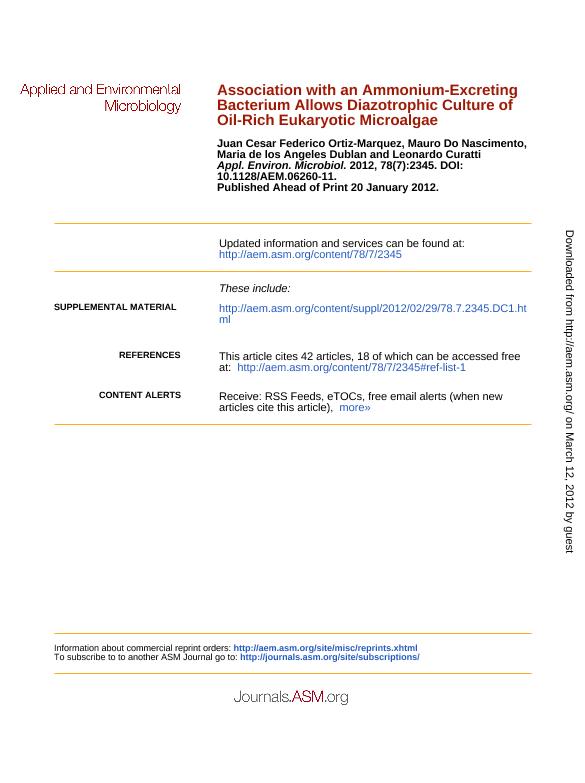Artículo
Association with an ammonium-excreting bacterium allows diazotrophic culture of oil-rich eukaryotic microalgae
Ortiz Marquez, Juan César Federico ; Do Nascimento, Mauro
; Do Nascimento, Mauro ; Dublan, María de Los Ángeles
; Dublan, María de Los Ángeles ; Curatti, Leonardo
; Curatti, Leonardo
 ; Do Nascimento, Mauro
; Do Nascimento, Mauro ; Dublan, María de Los Ángeles
; Dublan, María de Los Ángeles ; Curatti, Leonardo
; Curatti, Leonardo
Fecha de publicación:
04/2012
Editorial:
American Society for Microbiology
Revista:
Applied and Environmental Microbiology
ISSN:
0099-2240
Idioma:
Inglés
Tipo de recurso:
Artículo publicado
Clasificación temática:
Resumen
Concerns regarding the depletion of the world's reserves of oil and global climate change have promoted an intensification of research and development toward the production of biofuels and other alternative sources of energy during the last years. There is currently much interest in developing the technology for third-generation biofuels from microalgal biomass mainly because of its potential for high yields and reduced land use changes in comparison with biofuels derived from plant feedstocks. Regardless of the nature of the feedstock, the use of fertilizers, especially nitrogen, entails a potential economic and environmental drawback for the sustainability of biofuel production. In this work, we have studied the possibility of nitrogen biofertilization by diazotrophic bacteria applied to cultured microalgae as a promising feedstock for next-generation biofuels. We have obtained an Azotobacter vinelandii mutant strain that accumulates several times more ammonium in culture medium than wild-type cells. The ammonium excreted by the mutant cells is bioavailable to promote the growth of nondiazotrophic microalgae. Moreover, this synthetic symbiosis was able to produce an oil-rich microalgal biomass using both carbon and nitrogen from the air. This work provides a proof of concept that artificial symbiosis may be considered an alternative strategy for the low-N-intensive cultivation of microalgae for the sustainable production of next-generation biofuels and other bioproducts.
Palabras clave:
oil-rich eukaryotic microalgae
,
nitrogen fixation
,
biofuels
Archivos asociados
Licencia
Identificadores
Colecciones
Articulos(OCA PQUE. CENTENARIO)
Articulos de OFICINA DE COORDINACION ADMINISTRATIVA PQUE. CENTENARIO
Articulos de OFICINA DE COORDINACION ADMINISTRATIVA PQUE. CENTENARIO
Citación
Ortiz Marquez, Juan César Federico; Do Nascimento, Mauro; Dublan, María de Los Ángeles; Curatti, Leonardo; Association with an ammonium-excreting bacterium allows diazotrophic culture of oil-rich eukaryotic microalgae; American Society for Microbiology; Applied and Environmental Microbiology; 78; 7; 4-2012; 2345-2352
Compartir
Altmétricas



